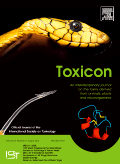
TOXICON
metrics 2024
Exploring the Frontiers of Toxicological Research
Introduction
TOXICON is a prominent peer-reviewed journal dedicated to advancing the field of toxicology and its related disciplines. Published by PERGAMON-ELSEVIER SCIENCE LTD, this journal has been a crucial resource for researchers since its inception in 1962, with a focus on disseminating high-quality research until 2024 and beyond. TOXICON features comprehensive studies spanning the biochemical, biochemical, and regulatory aspects of toxology, making it essential for researchers, professionals, and students alike. With a current impact factor that places it in the Q3 category of Toxicology and a Scopus rank of 67 out of 133 in its field, it serves as a valuable platform for innovative findings and discussions. Although it does not offer open access options, TOXICON's rigorous editorial standards ensure that published work meets the highest scholarly criteria, thereby enhancing its contribution to toxicological science.
Metrics 2024
 0.52
0.52 2.60
2.60 2.70
2.70 144
144Metrics History
Rank 2024
Scopus
IF (Web Of Science)
JCI (Web Of Science)
Quartile History
Similar Journals
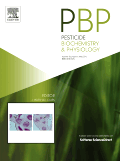
Pesticide Biochemistry and Physiology
Bridging agricultural practices with cutting-edge biochemistry insights.Pesticide Biochemistry and Physiology, published by Academic Press Inc Elsevier Science, is a prominent peer-reviewed journal dedicated to advancing knowledge in the fields of agronomy, crop science, and the toxicological effects of pesticides. With an established history since 1971, this journal aims to provide a platform for researchers and professionals to share groundbreaking studies that bridge the gap between agricultural practices and environmental health. Holding a remarkable Q1 ranking in both Agronomy and Crop Science as well as Health, Toxicology, and Mutagenesis, it reflects the journal's commitment to high-quality research. The journal is essential reading for anyone involved in the sustainability of agricultural ecosystems, offering insights into the biochemical interactions of pesticides and their physiological impacts on various crops and non-target organisms. As the global demand for sustainable agricultural practices escalates, Pesticide Biochemistry and Physiology remains at the forefront, promoting innovative research to ensure both food security and environmental safety. Converged through an extensive range of studies, this journal is a valuable resource for researchers, professionals, and students aiming to make significant contributions to the evolving landscape of pesticide biochemistry.
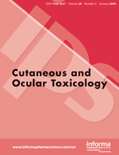
Cutaneous and Ocular Toxicology
Enhancing understanding of toxic effects through collaboration.Cutaneous and Ocular Toxicology, published by Taylor & Francis Ltd, is an essential resource in the fields of toxicology and pharmacology, focusing specifically on the effects of substances on the skin and eyes. With an ISSN of 1556-9527 and an E-ISSN of 1556-9535, this journal has been a vital platform for disseminating research since its inception in 1982, continuing its contributions to the scientific community through to 2024. Recognized for its academic rigor, it currently holds a Q3 ranking in the Medicine (miscellaneous) and Toxicology categories, reflecting its value among researchers and practitioners. The open access option enhances the journal's visibility and allows wider dissemination of knowledge, making it a key resource for professionals, students, and researchers dedicated to understanding and mitigating toxicological effects. Situated in the United Kingdom, Cutaneous and Ocular Toxicology strives to foster interdisciplinary collaboration and elevate the standards of toxicological research.
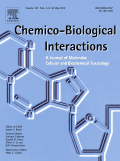
CHEMICO-BIOLOGICAL INTERACTIONS
Fostering Breakthroughs in Toxicology and MedicineCHEMICO-BIOLOGICAL INTERACTIONS is a premier journal published by Elsevier Ireland Ltd, dedicated to advancing the field of chemical and biological interactions since its inception in 1969. With a robust focus on pharmacology and toxicology, the journal holds a prestigious Q1 ranking in both Medicine (miscellaneous) and Toxicology, reflecting its significance in disseminating influential research. As part of the Scopus database, it ranks #21 out of 133 journals in Toxicology, positioning it in the 84th percentile and ensuring high visibility for cutting-edge studies. This scholarly platform serves as a crucial resource for researchers, professionals, and students who seek reliable and innovative findings at the intersection of chemistry and biology. While currently not open access, CHEMICO-BIOLOGICAL INTERACTIONS provides a comprehensive collection of articles that contribute to the ongoing dialogue in toxin research and its implications on medicinal chemistry, thereby fostering advancements in public health and safety.
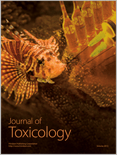
Journal of Toxicology
Innovating safety through cutting-edge toxicological research.Journal of Toxicology, published by HINDAWI LTD, stands as a pivotal open-access journal in the fields of toxicology and pharmacology since its inception in 2009. With an ISSN of 1687-8191 and an E-ISSN of 1687-8205, this journal is dedicated to disseminating high-quality research that critically examines the effects of toxic substances on living organisms. Located in Egypt and operating from their London office, it aims to provide an extensive platform for researchers worldwide to share findings that can inform better practices in safety and regulation. As of 2023, it has achieved significant recognition, holding a Q3 ranking in both the pharmacology and toxicology categories, and is indexed in Scopus with noteworthy percentile rankings (Toxicology: 57th and Pharmacology: 55th). With a focus on innovative studies and emerging areas such as environmental toxicology, biomarker research, and therapeutic interventions, the Journal of Toxicology invites both experienced researchers and students to contribute, thereby enhancing the breadth and depth of toxicological knowledge for the global scientific community.

Toxins
Innovating research to combat toxic challenges in our environments.Toxins, published by MDPI, is a leading open-access journal specializing in the field of toxicology, with a strong emphasis on the health implications of toxins across various environments. Established in 2009, this journal has quickly ascended to prominence, attaining a Q1 ranking in both the Health, Toxicology and Mutagenesis and Toxicology categories, underscoring its significant contribution to the scientific community. With an impressive Scopus ranking, placing it within the top percentile of related fields, Toxins serves as a vital resource for researchers, professionals, and students dedicated to advancing knowledge in toxicology and environmental health. The journal encourages the open dissemination of innovative research and critical reviews that explore the mechanisms, effects, and management of toxic substances, thus ensuring that vital research outcomes reach a global audience. For those looking to keep abreast of cutting-edge developments in the field, Toxins is an indispensable platform for scientific exchange and collaboration.

Iranian Journal of Pharmaceutical Research
Championing excellence in pharmacological research and discovery.Welcome to the Iranian Journal of Pharmaceutical Research, a pioneering publication in the field of pharmacology, toxicology, and pharmaceutics, published by BRIEFLAND. Established in 2002, this journal has been a crucial platform for disseminating innovative research and scholarly articles, contributing significantly to the advancement of pharmaceutical sciences in Iran and beyond. With an impressive trajectory leading towards a convergence of knowledge by 2024, it proudly holds a Q3 ranking in Pharmacology (Medical) and a Q2 ranking in the broader realm of Pharmacology, Toxicology, and Pharmaceutics for 2023. The journal's influence is underscored by its Scopus rank of #25/80 in General Pharmacology, Toxicology, and Pharmaceutics, placing it within the 69th percentile, therefore appealing to researchers, professionals, and students alike. Although the journal operates under a non-open access model, it remains dedicated to providing high-quality research articles that explore the latest advancements in pharmaceutical sciences, making it an essential resource for anyone involved in this vibrant field of study.
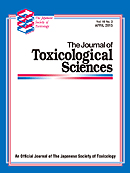
JOURNAL OF TOXICOLOGICAL SCIENCES
Enhancing Knowledge in Toxicology and BeyondThe Journal of Toxicological Sciences, published by the Japanese Society of Toxicological Sciences, is a prominent academic journal dedicated to the comprehensive study of toxicology and its related fields. Since its inception in 1976, the journal has provided a vital platform for researchers and professionals to disseminate innovative findings and insights in toxicology, with a focus on both experimental and clinical studies. Positioned in the Q3 quartile across various relevant categories, including Medicine (miscellaneous) and Toxicology as of 2023, the journal plays an essential role in advancing our understanding of toxic substances and their effects on biological systems. Although currently not open access, the journal maintains high academic standards and is indexed in Scopus, ranking #96 in Toxicology. Offering unique perspectives from Japan, it encourages global collaboration and discourse among toxicologists, making it an invaluable resource for students, researchers, and industry professionals alike.
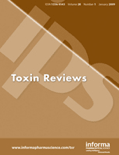
Toxin Reviews
Unveiling the Hidden Effects of ToxinsToxin Reviews is a premier academic journal focused on the critical field of Toxicology, published by Taylor & Francis Inc. Established with an aim to foster research and disseminate knowledge, this journal has been pivotal since its inception in 1982 and continues to be a leading platform for both emerging and established researchers. With an impressive impact factor and ranked in the 75th percentile among its peers in the Scopus categories, it serves as an essential resource for scientists, practitioners, and students interested in understanding the complexities of toxins and their effects on health. The journal provides an Open Access platform, enhancing visibility and accessibility of research findings to a broader audience. Covering a wide scope, Toxin Reviews plays a vital role in bridging gaps between toxicological research and practical applications, ensuring that rigorous scientific inquiry translates into real-world solutions.

TOXICOLOGY AND APPLIED PHARMACOLOGY
Navigating the Nexus of Safety and EfficacyTOXICOLOGY AND APPLIED PHARMACOLOGY, published by Academic Press, Inc. Elsevier Science, stands as a leading journal in the domains of toxicology and pharmacology, with its establishment dating back to 1959. With an impact factor reflecting its academic rigor and relevance, this journal is classified in the Q2 quartile for both pharmacology and toxicology categories, underscoring its significance in the scientific community. It ranks #34 out of 133 in Toxicology and #95 out of 313 in Pharmacology according to Scopus, placing it within the 74th and 69th percentiles, respectively. The journal aims to disseminate quality research that drives advancements in understanding the interactions of drugs and toxic substances within biological systems. Researchers and professionals are invited to contribute and engage with a broad spectrum of articles that cover mechanistic studies, risk assessment, and innovative therapeutic strategies. Although the journal does not offer open access, it continues to be a crucial resource for those who seek to navigate the complex interface of drugs and their toxicological implications.
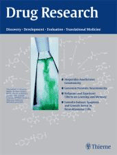
Drug Research
Transforming Ideas into Therapeutic RealitiesDrug Research, published by GEORG THIEME VERLAG KG, is a pivotal journal housed in the vibrant realm of pharmacology and drug discovery. With a commitment to advancing the understanding of medicinal substances, this journal serves as an essential resource for researchers, professionals, and students dedicated to the field. The journal boasts an ISSN of 2194-9379 and an E-ISSN of 2194-9387, reflecting its dual commitment to print and digital accessibility. Despite its status as a Q3 journal in both Drug Discovery and Miscellaneous Medicine categories as of 2023, it continues to offer valuable insights with a focus on the latest innovations, methodologies, and findings in drug research. Based in Germany, Drug Research promotes scholarly communication and collaboration within the scientific community, ensuring that its contributions remain impactful in shaping future therapeutic discoveries. The journal is indexed in relevant databases, enhancing its visibility and reach, thus fostering a robust academic dialogue.